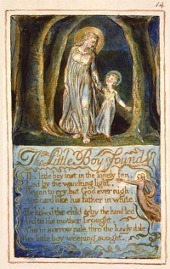Songs of Innocence and Experience Contents
The Little Boy Found - Synopsis and commentary
Synopsis of The Little Boy Found

The little boy who is lost wanders, following the inconstant marsh lights. He begins to cry but God appears to him, as a father figure. He kisses the child and restores him to his mother who has been searching for him in tears.
This is a companion poem to The little boy lost. That poem looked at failure in parental care. This poem looks at the way in which belief in God's fatherhood can be seen as a teaching used to maintain a sense of security in the face of the dangers of life.
Commentary
The poem reads like a piece of contemporary children's verse, giving assurance that God always protects his children, like a good father. However, the line: ‘appears like his father', could also suggest that this external Father God is simply a fantasy of perfect fatherhood, substituting for the reality. This would accord with what is known of Blake's beliefs.
Similarly, the restoration of the child to his mother appears highly positive. However, there are some issues to be aware of:
- This mother is, in herself, ineffective. She has been searching in the ‘dale' while the child is lost in the ‘fen'. She'd had little idea of where her child might be and perhaps little idea of what her child's existence is really like
- The child is given to his mother, as though he is her possession. Yet parents have already been seen to be suspect. What might this say about the future freedom of the child?
Like its companion piece this poem is aware of the potential inadequacy of parent –figures. When the innocent are unaware of this it demonstrates that innocence is vulnerable; lacking wisdom provides an incomplete vision of life. In this sense, Blake can also be seen to parody contemporary Christian approaches to God as an external ‘father figure'.
Investigating The Little Boy Found
- What picture of human parents are you given in this poem?
- Do you agree or disagree with the interpretation given above?
Related material
Scan and go

Scan on your mobile for direct link.